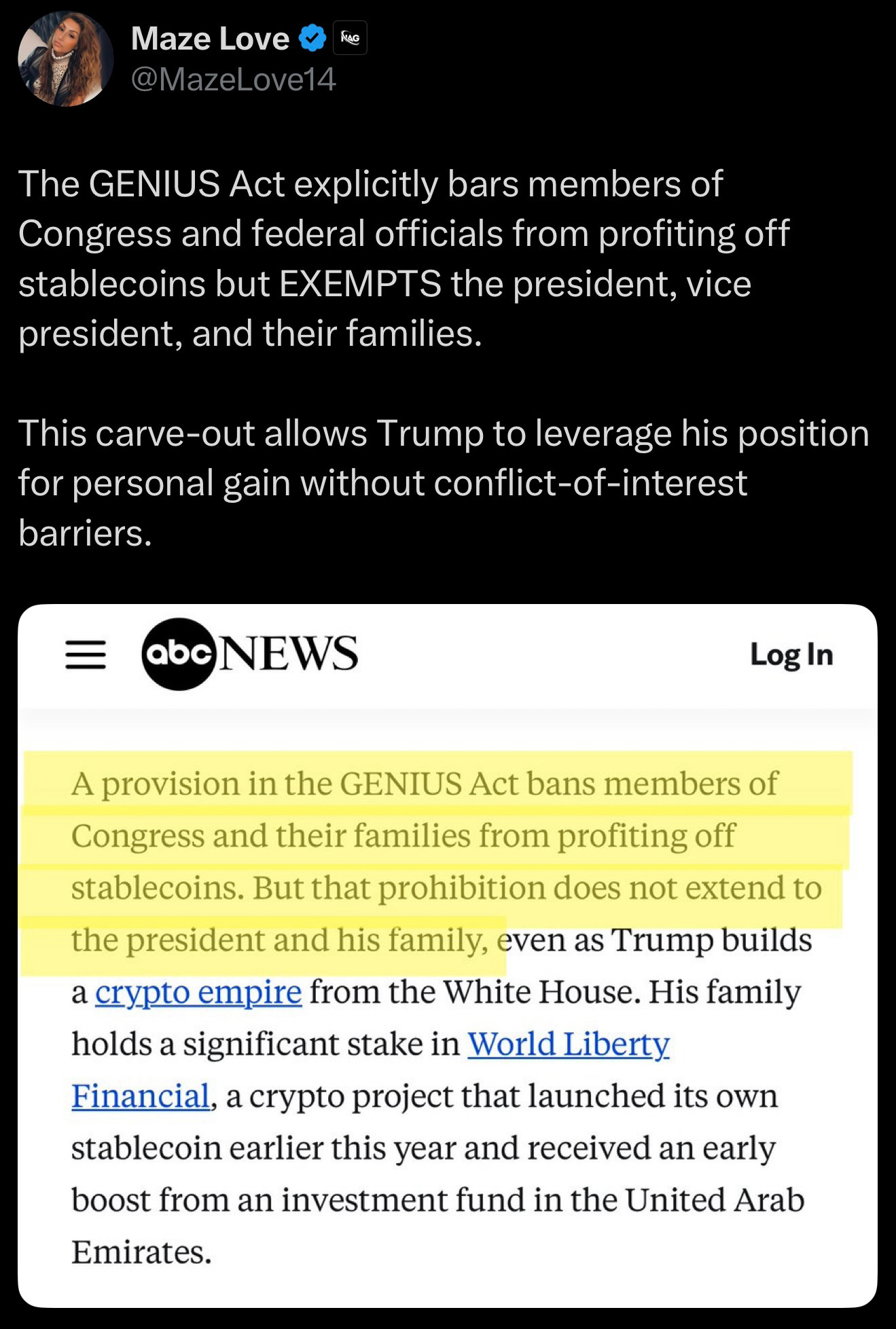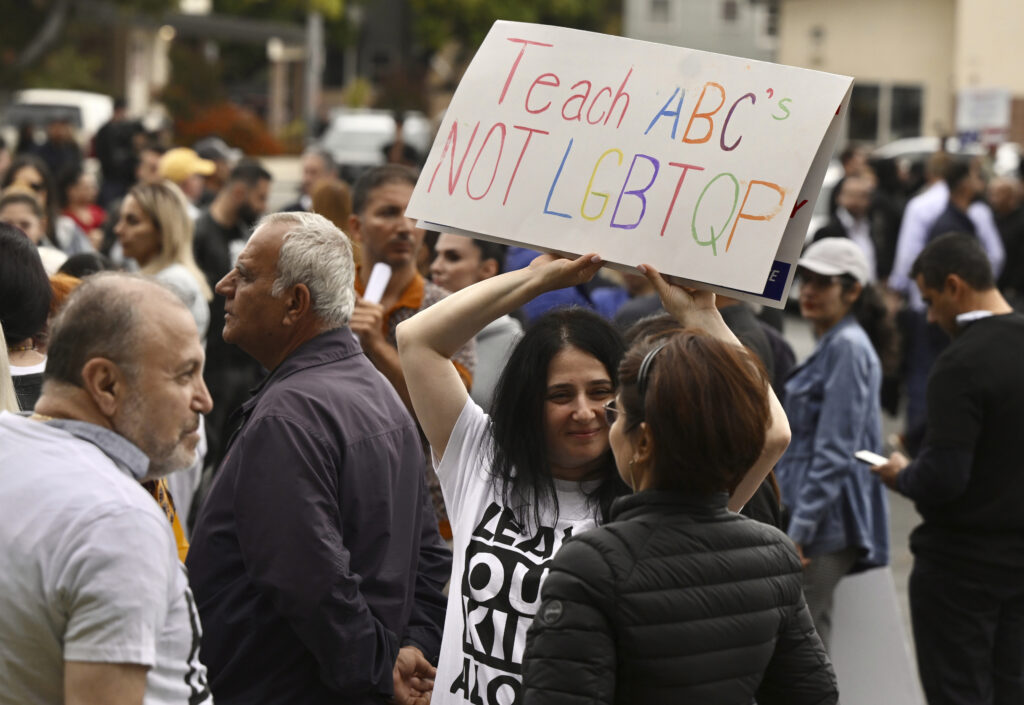
Conservative groups and LGBTQ+ rights supporters protest outside the Glendale Unified School District offices in Glendale on June 6, 2023. Several hundred people gathered at district headquarters, split between those who support or oppose teaching that exposes youngsters to LGBTQ+ issues in schools.
Credit: Keith Birmingham/The Orange County Register via AP
Conflicts between parents, teachers and school leaders over parental rights policies focusing on LGBTQ+ students, limitations on teaching about race and racism, and book bans have come with a cost — both socially and financially.
The conflicts are disrupting school districts, negatively impacting schools and classrooms, and costing districts money that could be used to better serve students, according to “The Costs of Conflict, The Fiscal Impact of Culturally Divisive Conflicts on Public Schools in the United States,” released last month.
Researchers from UCLA, the University of Texas at Austin, American University and UC Riverside conducted a national survey of K-12 public school superintendents from 46 states — 467 in all — and found that these conflicts are prevalent.
Since the 2020-21 school year, uncivil discourse and hostile political rhetoric at school board meetings and on school campuses has been an ongoing problem. Two-thirds of the school superintendents surveyed for the study said they have experienced moderate to high levels of culturally divisive conflict in their districts, including misinformation campaigns, violent rhetoric and threats.
Cultural conflicts cost U.S. school districts about $3.2 billion last school year, according to the study. Researchers estimate that districts with high levels of conflict spent about $80 per student. Districts with moderate levels of conflict spent $50 per student, and districts with low conflict spent $25 per student.
“This is costing us general fund dollars,” said a superintendent from a midsize school district in a Western state. “In the 2023-24 school year, the district spent an additional $100,000 on security, hiring armed plainclothes off-duty officers … because people coming to the board meetings are unpredictable and sometimes violent.”
Researchers allowed superintendents to remain anonymous in the report.
The superintendent also said the district spent more than $500,000 in legal fees on lawsuits associated with a board member and a campaign against the LGBTQ+ community, and lost $250,000 in outside funding from social services organizations because of the dispute. It also spent $80,000 on recruiting and training new staff to replace teachers, counselors and administrators who left because they did not want to work in such a divisive setting.
“Culturally divisive conflicts have substantial costs to the public and to our capacity as a state to mount quality learning experiences for all students,” said John Rogers, director of the UCLA Institute for Democracy, Education and Access and lead researcher on the report. “It has a fiscal cost that we’ve tried to lay out with some specificity, and it has broader social costs as well — there’s an undermining of social trust, there’s a deepening sense of stress and all of this is hugely consequential for how educators experience public schools and how young people are experiencing public schools.”
Costs of conflict can’t always be counted in dollars
Average-sized school districts of about 10,000 students spent about $811,000 each last school year to cope with cultural division, according to the study. The money was spent on legal fees, added security, additional staff time and on community, school board and government relations. Districts also incurred indirect costs because of staff turnover related to the conflict and because staff had to take time away from their other duties to deal with discord.
According to the survey, the largest expense for districts with cultural conflict came from staff turnover, with districts of about 10,000 students spending between $148,000 and $461,000, depending on the level of conflict.
One superintendent said that cultural conflict has caused “incredible stress on leaders and teachers as they navigate imaginary slights and online drama in the community.” A Pennsylvania superintendent called the emotional stress and anxiety “nearly crippling.”
“This research makes clear that culturally divisive conflicts in the nation’s schools are generating fear, stress and anxiety that is disrupting school districts and taking a personal toll on the educators and staff members who work in them,” Rogers said.
The stress has also led to increased staff absenteeism at schools, even in districts with lower levels of conflict, according to the report.
Half of the superintendents surveyed said they had been personally harassed at least once during the school year. Ten percent reported being threatened with violence, and 11% had their property vandalized.
As a result, superintendent turnover has also increased — from 14.2% to 17.1% — over the past four years. More than 40% of the superintendents who left their jobs in the last year said their decision was related to conflict, stress and politics, according to the report.
“The relentless demands of leading a district can easily overshadow their own well-being, which, if neglected, not only affects their personal health but also the health and stability of students, educators, and families they serve,” said Rachel S. White of the University of Texas at Austin in a statement. “Reducing the extent to which superintendents experience unwarranted divisiveness is an important step to change the trajectory of increasing superintendent churn.”
Superintendents who were surveyed expressed concern that the time they spent managing cultural conflict, including responding to Freedom of Information Act requests, and unsubstantiated rumors and misinformation, is keeping them from focusing on improving instruction.
California not immune to divisive conflict
Rogers said that while cultural conflict wasn’t as common in California as in other parts of the country in 2021-22, it has grown over the last few years.
Donald Trump’s election is likely to bring more cultural division to school campuses, Rogers said.
“I think that a Trump victory will lead some on the right to take a message that these sorts of cultural attacks, that have been playing out across the United States and across California in the last couple of years, are an effective strategy for mobilizing the base and for energizing the electorate,” said Rogers, in an interview the day before the election.
“A Trump victory will mean that Donald Trump will have more of a presence in our public life in the months to come. And so, that too will mean that he will be using language and framing that will further activate attacks on public schools around these culturally divisive issues.”



